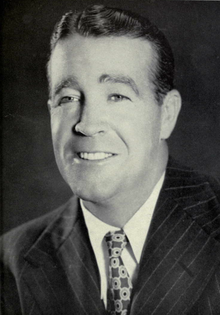Frank Leahy

Leahy from The 1949 Dome
|
|
| Sport(s) | Football |
|---|---|
| Biographical details | |
| Born |
August 27, 1908 O'Neill, Nebraska |
| Died | June 21, 1973 (aged 64) Portland, Oregon |
| Playing career | |
| 1928–1930 | Notre Dame |
| Position(s) | Tackle |
| Coaching career (HC unless noted) | |
| 1931 | Georgetown (line) |
| 1932 | Michigan State (line) |
| 1933–1938 | Fordham (line) |
| 1939–1940 | Boston College |
| 1941–1943 | Notre Dame |
| 1946–1953 | Notre Dame |
| Administrative career (AD unless noted) | |
| 1947–1949 | Notre Dame |
| 1960 | Los Angeles Chargers (GM) |
| Head coaching record | |
| Overall | 107–13–9 |
| Bowls | 1–1 |
| Accomplishments and honors | |
| Championships | |
| 5 National (1940, 1943, 1946–1947, 1949) | |
| Awards | |
| AFCA Coach of the Year (1941) | |
|
College Football Hall of Fame Inducted in 1970 (profile) |
|
Francis William Leahy (August 27, 1908 – June 21, 1973) was an American football player, coach, college athletics administrator, and professional sports executive. He served as the head football coach at Boston College from 1939 to 1940 and at the University of Notre Dame from 1941 to 1943 and again from 1946 to 1953, compiling a career college football record of 107–13–9. His winning percentage of .864 is the second best in NCAA Division I football history, trailing only that of fellow Notre Dame Fighting Irish coach, Knute Rockne, for whom Leahy played from 1928 to 1930. Leahy played on two Notre Dame teams that won national championships, in 1929 and 1930, and coached four more, in 1943, 1946, 1947, and 1949. Leahy was also the athletic director at Notre Dame from 1947 until 1949 when he passed the role to the Fighting Irish basketball coach, Moose Krause, so that he could focus on football coaching. Leahy served as the general manager for the Los Angeles Chargers of the American Football League (AFL) during their inaugural season in 1960. He was inducted into the College Football Hall of Fame as a coach in 1970.
Leahy was born in O'Neill, Nebraska and graduated from Winner High School in Winner, South Dakota where he was a football standout. He attended the University of Notre Dame, where he played football as a tackle on Knute Rockne's last three teams (1928–1930), and graduated from the university in 1931.
...
Wikipedia
